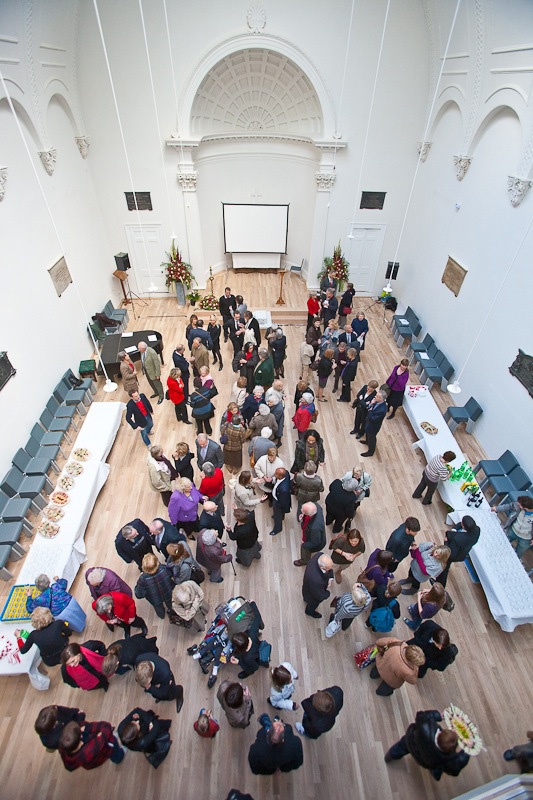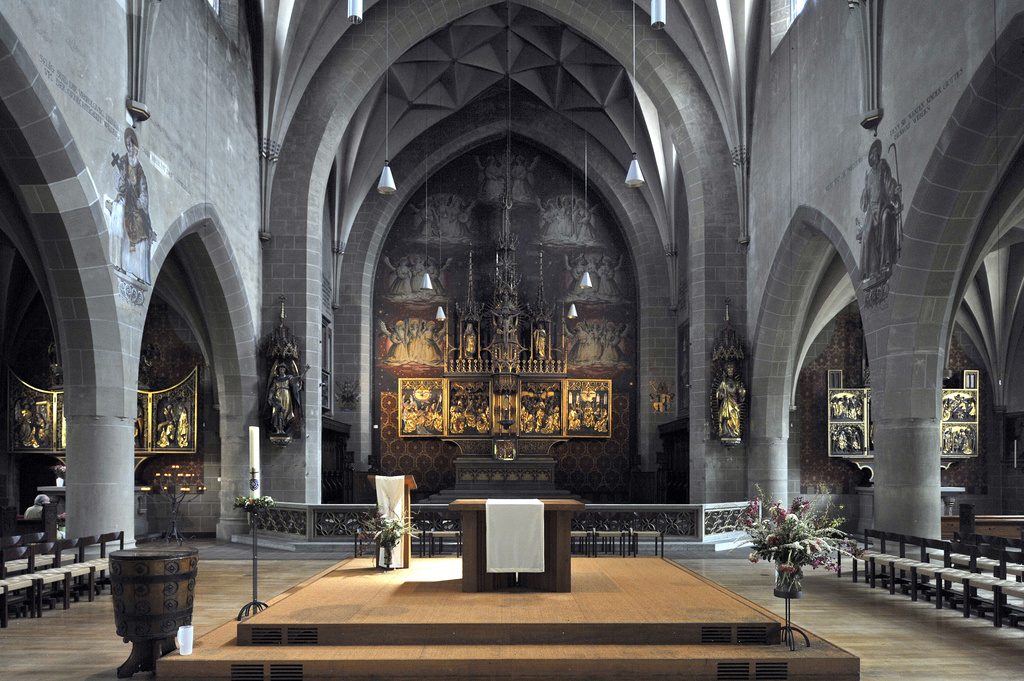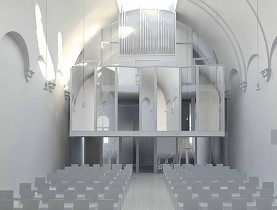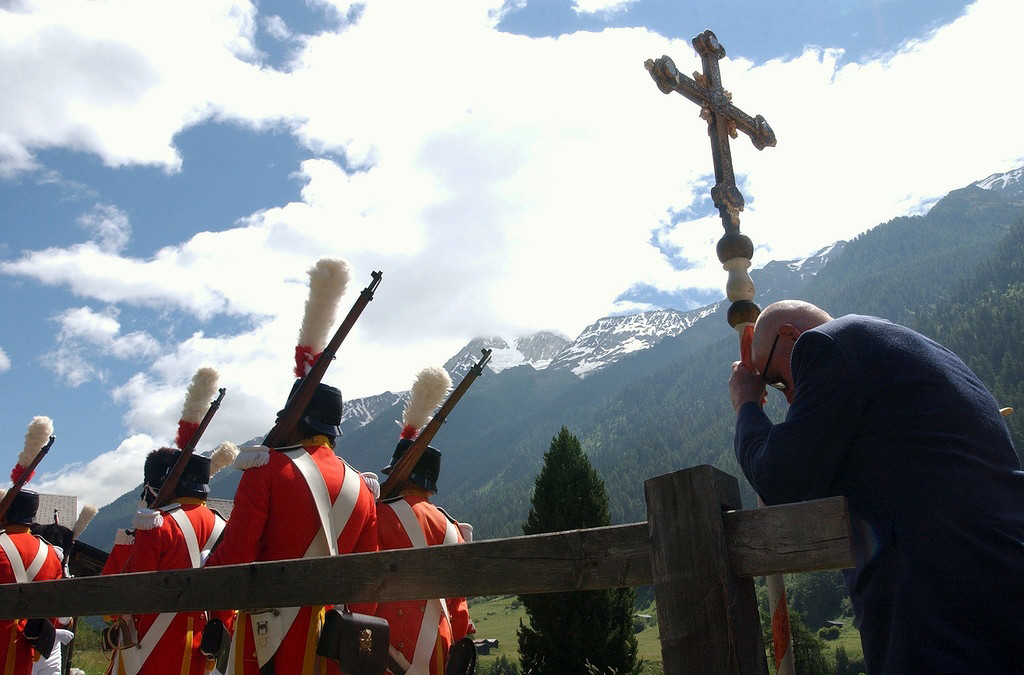London’s Swiss Church looks to uncertain future

London’s Swiss Church community has celebrated its 250th anniversary with the necessary pomp and circumstance, but its concerns are firmly in the future, with the perspective of less funding from home more than likely.
Dignitaries from London and representatives from the Commission of Swiss Churches Abroad mingled with scores of expats this weekend to mark the occasion.
Swiss Ambassador to Britain Anton Thalmann opened the celebratory weekend early Saturday evening with a fundraising reception for the Swiss Church and called the anniversary a “truly historic milestone”.
The original place of worship for expatriates was founded by French-speaking Swiss Protestants in 1762. The current building in Covent Garden was first opened in 1855 and has been their spiritual home of Swiss Protestants in London ever since.
It was designed by George Vulliamy, who was of Swiss descent, and it was largely financed by contributions from the Swiss community, the canton of Zurich and churches in Bern.
More than 50 pastors – French and German – have preached to the Swiss community in London since records began in 1762.
Thalmann went on to describe the close ties the two establishments have shared and how in those early years the church was the main protector of the Swiss abroad.
“For more than forty years, before the consular representation was established in London in 1817, it was the church that acted as Swiss consul,” he told guests. “The pastor kept a registration record of the community and issued passports.”
Oldest parish outside Switzerland
Gottfried Locher, president of the Federation of Swiss Protestant Churches, put into perspective just how old the church is.
“We are here celebrating the oldest parish outside of Switzerland,” he said. “There are many cantonal churches in Switzerland that are not as old.”
The Swiss church has survived many challenges in the past. Locher, who was also minister of London’s Swiss Church in the 1990s, praised what he called “this small, but stout” community for bringing people together.
“The two sides of the ‘Röstigraben’, this famous divider between the two parts of Switzerland, have been well and truly alive here for a long time,” he told his audience.
“Many of you will know it was only in the mid-1950s that the two communities actually merged. And when I arrived in 1994, there was still a sense of a divide.”
Changing perspectives
Sunday’s church service was equally celebratory, but as a large part of the 250-member congregation was in attendance, the tone focused more on what was needed for the church to move forward in its current state.
Locher spelled out some of the challenges ahead. He began by making clear there had always been financial constraints on Swiss churches abroad and that it was likely that even less money would be available in the coming years.
“Numbers are down. The average age is up. We need to change our perspectives.”
Locher was not even sure if young people were the future of the church.
“People here have to adapt to reality, as it is,” he said. “There is no point in denying this reality, which as I see it, shows an uncertainty, as to whether younger people will join this community.”
Throughout the two-day event there were constant reminders that a church costs money and if London’s Swiss Church was important to the expatriate community, they would need to ensure that support on all levels.
Challenges ahead
Nathalie Duermueller, who has been the minister of the Swiss Church for the past four years, understands the challenge ahead and she and her team are constantly facing up to the future with creative and realistic plans.
“We often get requests from other local churches to hire our premises. Ventures like this help bring in much-needed revenue,” she said. “We also have artists and musicians who want to exhibit and perform in our premises. Our visual arts programme is starting to get a good reputation among the arts scene in London.”
Duermueller believes these new incentives may also lead to an increase in the size of the congregation.
“This is a Swiss meeting place, but of course it is also a church,” she explained. “If we attract different types of people here through our cultural programmes, these people may connect with the church. We should always remain an open venue that welcomes everybody.”
The Eglise Helvétique in London was established in 1762 by a group of expatriate “Swiss”, most of whom were not officially Swiss as they had mainly come from Geneva and Neuchâtel, which were not yet part of the Swiss Confederation.
Under the inspiration of Justin Vulliamy, the first Consistoire or Group of Anciens as they were then known inaugurated the church. They rented a large room in Castle Street, Leicester Fields, and appointed Antoine Bugnion from Lausanne as their first pastor. As well as being a spiritual home for the expatriate Swiss, the church also became a centre of help for indigent Swiss in London.
In 1775, after appeals for funds and some financial aid from Geneva and Bern, the first purpose-built “Helvetic Chapel” was built near Moor Street in Soho. This remained the focal point for the Swiss in London for 80 years. The congregation was mainly French-speaking during that time.
The church also played an important role in the legal protection of the Swiss abroad in the early part of that period. There was no consular representation until 1817, so they had to rely on the pastor to be signatory for any important documentation regarding their status, including “pass-ports”.
1855 saw the inauguration of the current building in Endell Street, after much planning and fundraising in England and Switzerland.
In 1973 the Swiss Church was designated a Grade II, a building that English Heritage deems worthy of preserving for posterity.
The church was refurbished by Basel architects Christ & Gantenbein. The £2.2 million project was funded by private donations and a fundraising drive by the Swiss community in London.

In compliance with the JTI standards
More: SWI swissinfo.ch certified by the Journalism Trust Initiative











You can find an overview of ongoing debates with our journalists here . Please join us!
If you want to start a conversation about a topic raised in this article or want to report factual errors, email us at english@swissinfo.ch.